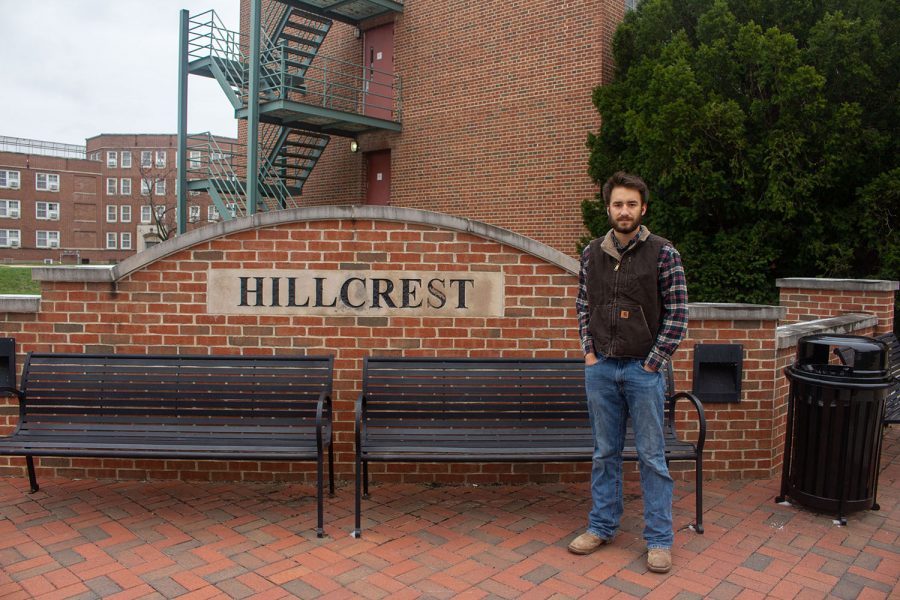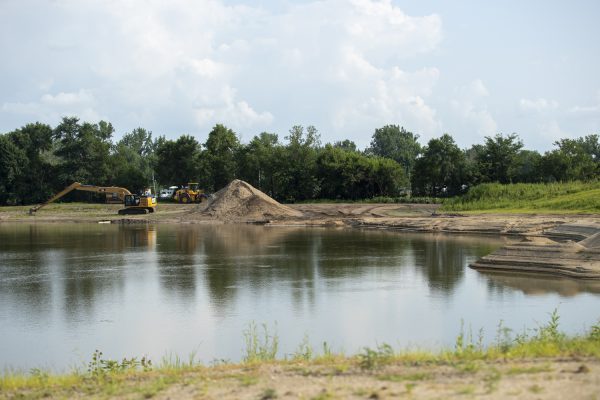Closed fitness centers in residence halls causes frustration for students
University Housing and Dining closed fitness centers in the residence halls due to COVID-19. Students have expressed frustration with the university’s decision.
University of Iowa freshman, Ethan Herzberg, poses for a portrait in front of Hillcrest Residence Hall on Oct. 26.
October 26, 2020
Fitness centers within the University of Iowa’s residence halls are closed for the fall 2020 semester, leaving some students upset at the lack of nearby options for working out.
UI first-year student Ethan Herzberg sent a detailed email to University Housing and Dining on Oct. 15, with questions and concerns about the fitness centers in the residence halls being closed. To this day, he said he has still not received a response.
Herzberg, a resident of Hillcrest Residence Hall who was disappointed and insulted by the university’s lack of response, said he took to the UI Class of 2024 Facebook group and posted his email for the rest of his peers to see, wondering if they agreed with his statements.
More than 160 people in the group, which is composed of just students from the incoming freshman class, liked the post and 20 commented.
Assistant Vice President for Student Life and Senior Director for Housing and Dining Von Stange said UI Housing and Dining decided at the beginning of the school year to shut down residence-hall fitness centers because of COVID-19 health and safety concerns.
There are fitness centers in Mayflower, Currier, Catlett, and Hillcrest residence halls. Other recreation facilities are open for reservation with limited hours. The 20,000 square-foot Campus Recreation and Wellness Center, at 309 S Madison St., is open except for its climbing wall, saunas, and steam rooms, which are closed. Closer to east-side residence halls, Fitness East, located in Halsey Hall, is open. The Field House, a campus recreation facility across the river on the west side of campus, is also open.
“We knew coming into the academic year that our focus was going to be on the health of our staff and students,” he said. “In order to do that, we need to be able to more frequently clean and disinfect our touch points in public areas.”
In order to fulfill their main focus, Stange said the university had to pull back in certain areas, including the fitness centers located in the residence halls.
“The fitness centers in the residence halls are not monitored, and we would not be able to determine what machines are being used, whether they were being cleaned between users, and if the users were wearing masks,” he said.
Stange said Housing and Dining was also concerned that the small enclosed space of a fitness center in a residence hall would be an epicenter for transmission of the virus.
When sending the email to the university about his concerns, Herzberger said he understood these points of concern, and brought them up in his email.
His main concerns were the inconvenience that students who live far from the recreation center and field house face, such as the cold weather that’s already starting and the overall health of him and his peers.
“This decision was made in order to redirect staffing efforts towards cleaning essential residence hall spaces,” the official University of Iowa account responded to Herzberger’s Facebook post.
RELATED: UI Recreation Services provides group fitness from a distance
Herzberger, as well as many other students, believe fitness centers are essential spaces for students and are an additional amenity that students are paying for, but not getting to use.
“Money is more important than student health?” he said. “One of the risk factors for COVID-19 is bad physical fitness.”
Herzberg also said with most students in all-virtual classes, their motivation to leave their dorms and walk to the Campus Recreation and Wellness Center or Field House is lacking.
Stange said he sees benefits to students leaving their residence halls to work out.
“You’re spending a lot of your life in your residence hall taking classes, eating, and socializing,” Stange said. “It gets them out of the building, it gets them somewhere else where they can see something different rather than residence halls.”
Maggie Rose, a first-year student living in Mayflower, said she walks 1.25 miles almost every morning to get to the recreation center. Because the weather is getting colder, she does not think that will be an option for much longer.
“I want to continue to work out, but the university is not giving us the means to do so,” she said. “It would be a different story if the buses came to Mayflower at 8 a.m., but they normally do not during the week.”
Rose commented on Herzberg’s post in support, because she had initially thought she and her roommate were the only ones confused and irritated about the university’s choice to close the fitness centers in the dorms.
“I found the email to perfectly represent what I had been thinking,” she said.
When Herzberg made the post, he just wanted to get the university’s attention because there was a lack of response over email. He was also wanting to hear opinions from his peers, however.
“I wanted to show people my feelings about what’s going on and I got a lot of positive feedback from it and a lot of people came out and said they feel the same way,” he said. “I just want the university to know that we want changes made.”















